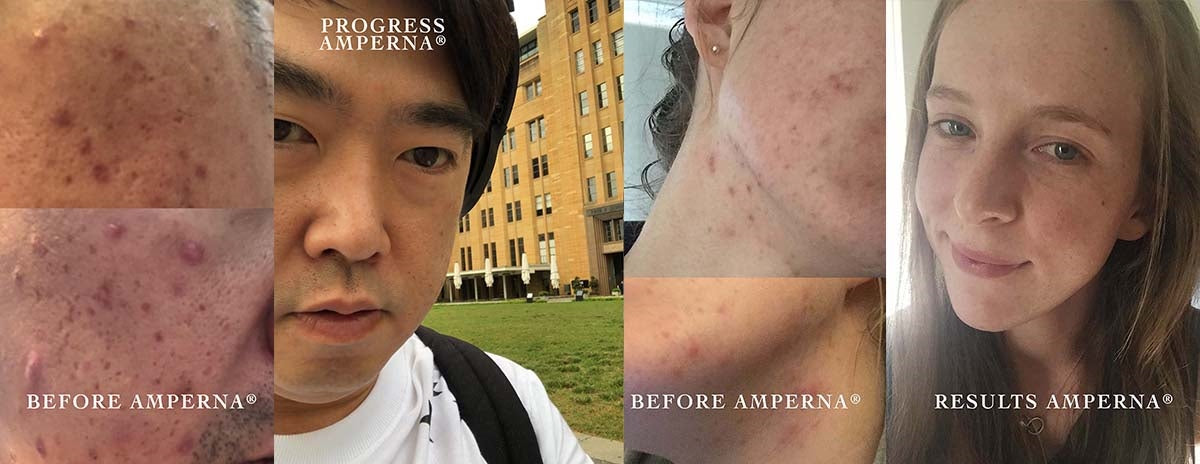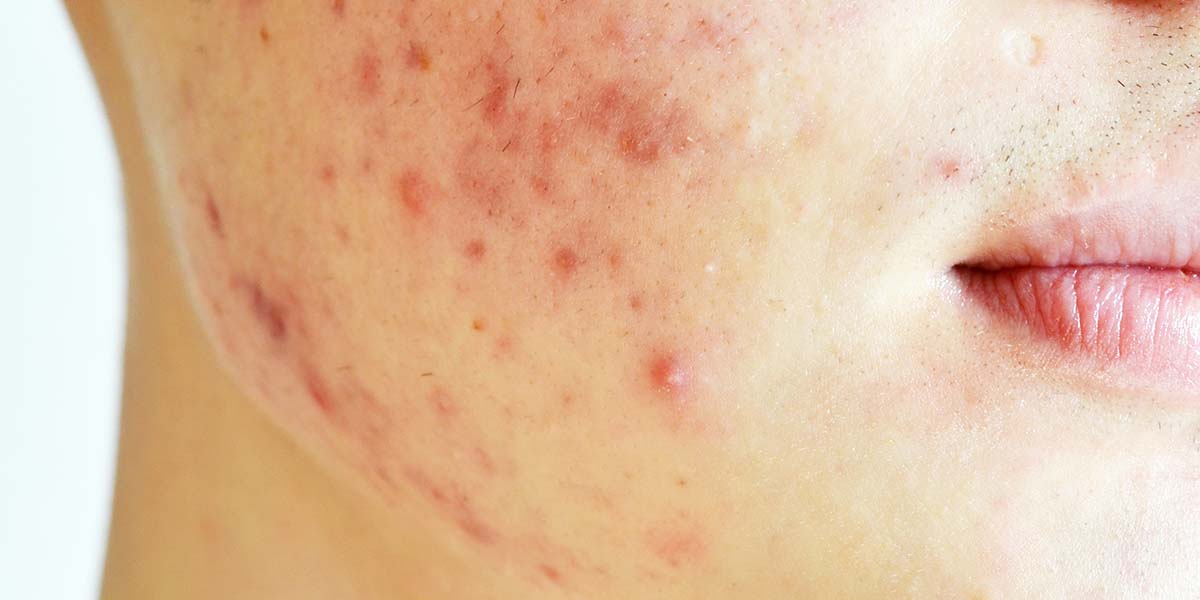When I was a teenager, (looking back twenty odd years ago) we had very few acne treatment options.
Many traditional acne treatments focused on surface symptoms like excess oil or bacteria, but did not address the root causes of breakouts, such as inflammation, barrier damage, hormonal imbalance, or microbiome disruption.
Traditional drying acne treatment products often lead to a cycle of irritation, sensitivity, and even more breakouts.
At AMPERNA®, we offer a different approach—one that is rooted in supporting your skin’s microbiome, not disrupting it.
What Is Topical Probiotic Skincare?
While traditional probiotics are live microorganisms you ingest, topical probiotics and postbiotics are non-living, skin-supportive ingredients derived from beneficial bacteria. They do not colonize the skin like live bacteria, but they deliver powerful bioactive compounds that help regulate and restore the skin barrier.
AMPERNA® uses Lactococcus ferment lysate, a lysate (cell extract) from the Lactococcus lactis strain, known for its soothing and barrier-reinforcing properties.

Why Acne-Prone Skin Needs Microbiome Support
Acne is not just about clogged pores — it is often linked to inflammation, skin barrier damage and an imbalance of skin microbes.
Harsh treatments like benzoyl peroxide, alcohol-based toners, and over-exfoliation can wipe out both harmful and beneficial bacteria, weakening your skin's natural defenses.
Probiotic-inspired skincare like AMPERNA® helps restore balance by:
-
Encouraging the growth of beneficial skin flora
-
Reducing overgrowth of acne-associated bacteria
-
Calming inflammation without damaging your barrier
How Lactococcus Ferment Lysate Helps Acne-Prone Skin
AMPERNA®’s topical probiotic complex is designed to support and protect stressed skin. Here is how Lactococcus ferment lysate helps if you have acne:
Strengthens the Skin Barrier - A healthy skin barrier is crucial to resisting acne-causing bacteria and reducing irritation. Lactococcus ferment lysate helps enhance skin renewal and barrier repair, so your skin becomes more resilient over time.
Reduces Inflammation - Acne is, at its core, an inflammatory condition. This unique lysate helps modulate the skin’s immune response, reducing redness, swelling, and post-inflammatory pigmentation.
Soothes Sensitivity and Redness - Many people with acne also suffer from sensitive, reactive skin. AMPERNA® products work to calm the skin, rather than strip it, making them ideal for inflamed breakouts and irritated skin.
Balances the Microbiome - By supporting a healthier skin microbiome, Lactococcus ferment lysate helps reduce the environment that allows acne bacteria to thrive, without the need for aggressive antibacterials.
You can read more information about topical probiotic benefits for acne-prone skin in this article: Topical Probiotics: More Than a Skin Deep - PMC
Topical Antibiotics Used to Treat Acne:
The most commonly prescribed topical acne antibiotics are:
Clindamycin
Clindamycin can reduce the severity and number of both inflammatory and noninflammatory acne lesions. The oral form of clindamycin is not used in the treatment of acne as it can cause diarrhea and inflammation of the colon.
Dapsone
Dapsone is most effective against inflammatory acne. In two large-scale clinical trials, the number of inflammatory lesions in people treated with dapsone 5% gel were reduced by almost half after 12 weeks of treatment.
Erythromycin
Like clindamycin, erythromycin is recommended for mild, moderate or severe acne in combination with other acne medications. Erythromycin is available as a cream, gel, lotion or swab. Unlike clindamycin, oral erythromycin can be prescribed to treat acne.
What Is Bacterial Resistance?
Bacterial resistance happens when the bacteria on our skin develops the ability to defeat the antibacterial drug that was designed to kill it. Bacterial resistance increases the risk that acne-causing bacteria will stop responding to antibiotics, making it increasingly difficult to cure acne, when going down the topical antibiotic path.
Possible Side Effects from Topical Antibiotics:
Most people can use topical antibiotics without difficulty, but some people may experience some side effects including:
- Dryness
- Flakiness
- Minor skin peeling
- Mild skin irritation
Topical antibiotics like clindamycin should be used for the shortest amount of time possible. Using topical antibiotics long-term increases the risk of bacterial resistance.

Why Choose AMPERNA® for Acne-Prone Skin?
AMPERNA® is more than just another skincare brand. We are dedicated to skin health, particularly for those struggling with sensitivity, breakouts, or barrier damage. Every formula is:
-
Fragrance-free and non-comedogenic
-
pH-balanced and microbiome-friendly
-
Suitable for even the most reactive, acne-prone skin
-
Developed with real people and real sensitivities in mind

Ingredients to Watch Out For
Alcohol
Products that contain high levels of alcohol such as ethanol, methanol, benzyl, denatured or isopropyl, are best avoided. Alcohol is often used as the base ingredient in skin care products to thicken them and allow them to penetrate the skin. The issue can be that it breaks down the skin's natural barriers and can lead to dryness and irritation.
Whilst most alcohol-based products can cause issues, cetyl alcohol is an exception. You may find this listed on products as hexadecan-1-ol or palmityl alcohol. This fatty alcohol is often as an emulsifier, emollient or thickener and can help to soften and smooth skin. It is not known to cause irritation.
Parabens
There are five different paraben esters to look out for: methyl-, ethyl-, propyl-, butyl- and benzyl-par hydroxybenzoate. They are often used in skin care products and cosmetics as a preservative and can cause problems such as contact dermatitis, create a flare or spread an existing rash.
Artificial fragrances
Skincare and cosmetics featuring man-made fragrances can aggravate allergies and trigger side effects. In particular fragrances created with Phthalates are wise to steer clear of. These are a group of chemicals considered to be endocrine disruptors.
Tea tree oil
This essential oil is often considered by people with a range of skin conditions. Whilst it may be beneficial to some, for others it can cause irritation such as redness, scaly skin, burning or stinging.

Sources:
https://dermnetnz.org/topics/allergy-to-parabens/
https://www.refinery29.com/en-us/best-worst-skin-ingredients
https://www.dermstore.com/blog/top_ten/skin-care-ingredients-to-avoid/
https://www.bustle.com/p/7-ingredients-to-avoid-if-you-have-sensitive-skin-68811


















